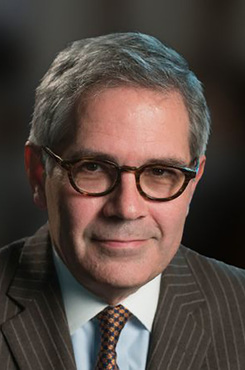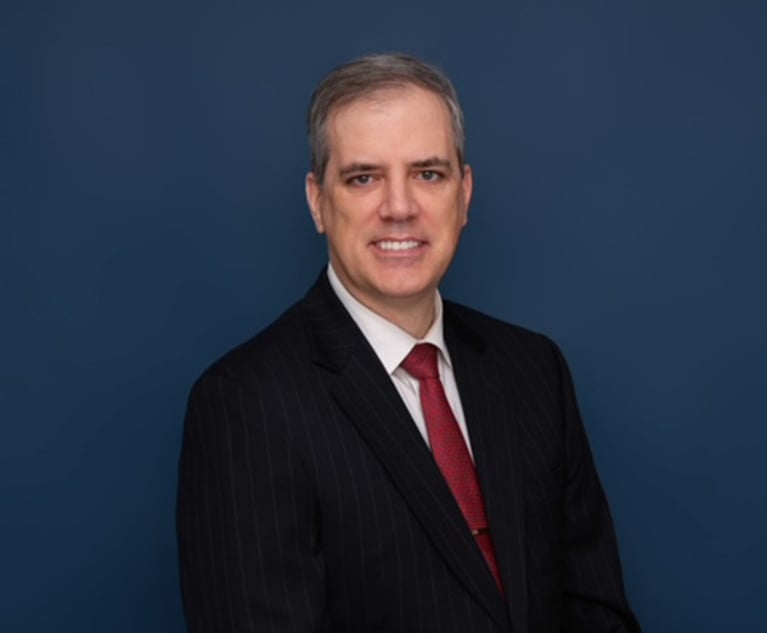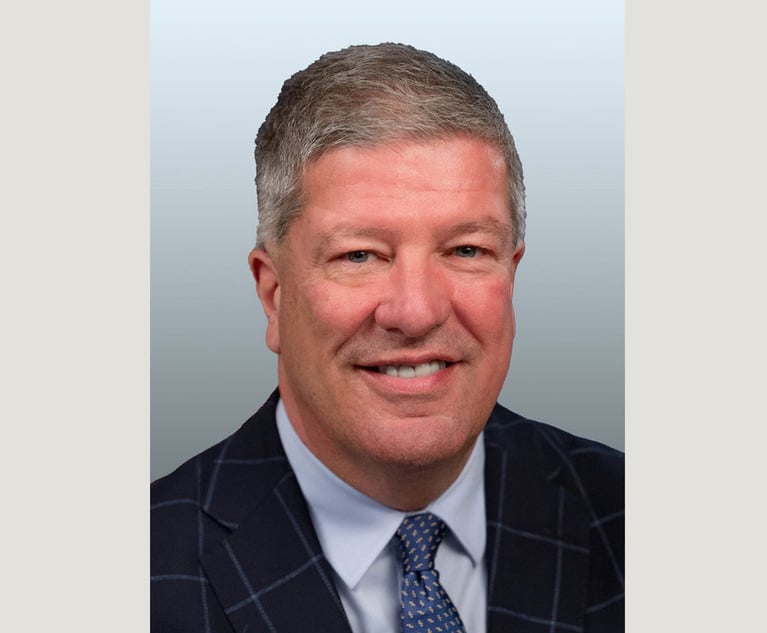Krasner Looks to Brooklyn as Model in Naming Immigration Counsel
Taking a cue from his counterpart in Brooklyn, Philadelphia District Attorney Larry Krasner has appointed an attorney to focus on evaluating the immigration ramifications of the office's prosecutions.
January 26, 2018 at 05:57 PM
4 minute read
 Larry Krasner.
Larry Krasner. Taking a cue from his counterpart in Brooklyn, Philadelphia District Attorney Larry Krasner has appointed an attorney to focus on evaluating the immigration ramifications of the office's prosecutions.
On Thursday, Krasner announced the appointment of attorney Caleb Arnold to become the office's first immigration counsel. Arnold, a former immigration attorney with Green and Spiegel, is expected to advise the office about immigration issues in an effort to minimize the effects that a criminal conviction for a low-level offense may have on a person's immigration status.
At a press conference Thursday, Krasner, who promised sweeping reforms for the District Attorney's Office including ramping up efforts to resist the recent clampdown on unauthorized immigrants, said the move was part of a broader effort aimed at protecting vulnerable communities and allowing them to play a greater role in the criminal justice system.
“You have to be very careful about your policies and what you criminalize because you may be helping crime rather than discouraging it, and we want to be discouraging it,” he said.
The decision to bring on a attorney to focus on immigration issues follows in the footsteps of Brooklyn District Attorney Eric Gonzalez, who brought on two immigration specialists to his prosecutors office last spring. Those attorneys work in the Immigrant Affairs Unit, which includes other assistant district attorneys, and their work has focused on advising about the immigration ramifications of plea bargains for misdemeanor offenses.
“The success of a similar policy in Brooklyn—where our special counsels advised in over 200 cases so far to reach immigration-neutral outcomes—proves that greater equity does not jeopardize public safety,” Gonzales said in a statement.
In Philadelphia Arnold is the only person in the office focusing solely on these issues, although a spokesman for the Philadelphia DA's office said that could change depending on the need. Arnold is set to begin working at the office on Monday.
Although Arnold is expected to develop the role immigration counsel will play for the office, according to Krasner, the work will likely come into play more during guilty plea negotiations and when making sentencing recommendations.
According to several attorneys, Brooklyn and Philadelphia appear to be the only two offices that have attorneys specifically tasked with looking at immigration issues. However, according to New York University professor Nancy Morawetz, prosecutors and the defense bar have become increasingly interested in the consequences that prosecutions may have on undocumented immigrants, particularly in the wake of the 2010 U.S. Supreme Court decision Padilla v. Kentucky, which held that attorneys have a constitutional obligation to tell their clients when a guilty plea carries a risk of deportation.
Prosecutors often don't seek jail time for minor offenses, she said, but without an understanding of immigration law, considerations aimed at mitigating the effects of a harsh sentence may backfire as some sentences can have lasting implications in the immigration context while others do not.
“Prosecutor's offices might pursue a course that is not what they want to do,” she said. “People in these prosecutors offices have the capacity to be giving more sophisticated advice to serve a prosecutorial objective.”
Labe Richman, a New York defense attorney who often has immigration issues arise in the cases he handles, said immigration law is extremely complicated, and it is not unusual that a charge carrying a lesser sentence ends up having a greater impact in an immigration context. Some seemingly minor offenses that may only carry a small fine could result in a lifetime ban against applying for a green card, he said.
“So the prosecutor, with their immigration attorney at hand, can say you've been here for 30 years, you have a family. Instead of barring you for life, we could bring another deal and have you plea to some other charge that's cognizable out of your case,” he said.
The ultimate sentence, he said, could result in more jail time, or more probation, but it won't result in any permanent implications for the defendant's immigration proceedings.
Richman said that defense associations have been increasingly bringing on immigration attorneys, and, even before the Brooklyn DA's Office announced it would be bringing on immigration attorneys, some prosecutors offices have been drafting guidelines so line prosecutors have a better understanding of the immigration implications of the criminal charges they are bringing.
“I've seen different memos and different law review articles talking about it because the community is going to lose confidence in us if we … have immigration consequences that are disproportionate to the penal consequences,” he said.
This content has been archived. It is available through our partners, LexisNexis® and Bloomberg Law.
To view this content, please continue to their sites.
Not a Lexis Subscriber?
Subscribe Now
Not a Bloomberg Law Subscriber?
Subscribe Now
NOT FOR REPRINT
© 2025 ALM Global, LLC, All Rights Reserved. Request academic re-use from www.copyright.com. All other uses, submit a request to [email protected]. For more information visit Asset & Logo Licensing.
You Might Like
View All


Stevens & Lee Hires Ex-Middle District of Pennsylvania U.S. Attorney as White-Collar Co-Chair
3 minute read
Judge Tanks Prevailing Pittsburgh Attorneys' $2.45M Fee Request to $250K
5 minute readTrending Stories
- 1Decision of the Day: Court Holds Accident with Post Driver Was 'Bizarre Occurrence,' Dismisses Action Brought Under Labor Law §240
- 2Judge Recommends Disbarment for Attorney Who Plotted to Hack Judge's Email, Phone
- 3Two Wilkinson Stekloff Associates Among Victims of DC Plane Crash
- 4Two More Victims Alleged in New Sean Combs Sex Trafficking Indictment
- 5Jackson Lewis Leaders Discuss Firm's Innovation Efforts, From Prompt-a-Thons to Gen AI Pilots
Who Got The Work
J. Brugh Lower of Gibbons has entered an appearance for industrial equipment supplier Devco Corporation in a pending trademark infringement lawsuit. The suit, accusing the defendant of selling knock-off Graco products, was filed Dec. 18 in New Jersey District Court by Rivkin Radler on behalf of Graco Inc. and Graco Minnesota. The case, assigned to U.S. District Judge Zahid N. Quraishi, is 3:24-cv-11294, Graco Inc. et al v. Devco Corporation.
Who Got The Work
Rebecca Maller-Stein and Kent A. Yalowitz of Arnold & Porter Kaye Scholer have entered their appearances for Hanaco Venture Capital and its executives, Lior Prosor and David Frankel, in a pending securities lawsuit. The action, filed on Dec. 24 in New York Southern District Court by Zell, Aron & Co. on behalf of Goldeneye Advisors, accuses the defendants of negligently and fraudulently managing the plaintiff's $1 million investment. The case, assigned to U.S. District Judge Vernon S. Broderick, is 1:24-cv-09918, Goldeneye Advisors, LLC v. Hanaco Venture Capital, Ltd. et al.
Who Got The Work
Attorneys from A&O Shearman has stepped in as defense counsel for Toronto-Dominion Bank and other defendants in a pending securities class action. The suit, filed Dec. 11 in New York Southern District Court by Bleichmar Fonti & Auld, accuses the defendants of concealing the bank's 'pervasive' deficiencies in regards to its compliance with the Bank Secrecy Act and the quality of its anti-money laundering controls. The case, assigned to U.S. District Judge Arun Subramanian, is 1:24-cv-09445, Gonzalez v. The Toronto-Dominion Bank et al.
Who Got The Work
Crown Castle International, a Pennsylvania company providing shared communications infrastructure, has turned to Luke D. Wolf of Gordon Rees Scully Mansukhani to fend off a pending breach-of-contract lawsuit. The court action, filed Nov. 25 in Michigan Eastern District Court by Hooper Hathaway PC on behalf of The Town Residences LLC, accuses Crown Castle of failing to transfer approximately $30,000 in utility payments from T-Mobile in breach of a roof-top lease and assignment agreement. The case, assigned to U.S. District Judge Susan K. Declercq, is 2:24-cv-13131, The Town Residences LLC v. T-Mobile US, Inc. et al.
Who Got The Work
Wilfred P. Coronato and Daniel M. Schwartz of McCarter & English have stepped in as defense counsel to Electrolux Home Products Inc. in a pending product liability lawsuit. The court action, filed Nov. 26 in New York Eastern District Court by Poulos Lopiccolo PC and Nagel Rice LLP on behalf of David Stern, alleges that the defendant's refrigerators’ drawers and shelving repeatedly break and fall apart within months after purchase. The case, assigned to U.S. District Judge Joan M. Azrack, is 2:24-cv-08204, Stern v. Electrolux Home Products, Inc.
Featured Firms
Law Offices of Gary Martin Hays & Associates, P.C.
(470) 294-1674
Law Offices of Mark E. Salomone
(857) 444-6468
Smith & Hassler
(713) 739-1250





